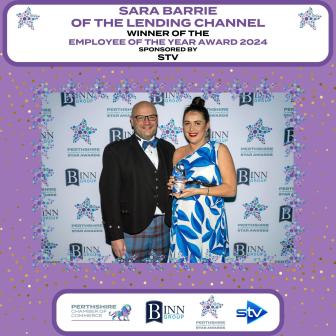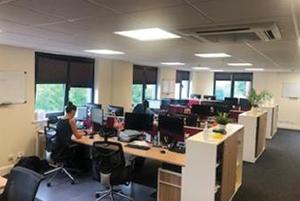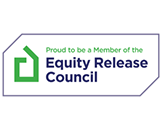Financing Your Business Property: A Guide for Entrepreneurs
Imagine your business is thriving, and you're considering taking the next big leap—investing in your own business property. It's an exciting thought, isn't it?
Owning a business property means stability, long-term growth, and even additional income through property appreciation. Yet, many entrepreneurs face the daunting challenge of securing financing for this significant investment. It can be overwhelming, full of questions like, "Where do I start?" or "How do I know if this is the right move for my business?"
We've been there. At The Lending Channel, we understand how critical and, at times, confusing the journey to secure business property financing can be. This guide is designed to walk you through everything you need to know—from understanding business mortgages to mitigating risks and exploring real success stories.
By the end, you'll feel more confident about making an informed choice for your business's future. Let’s dive in!
Why owning your business property makes sense
Owning your business property isn’t just about cutting rental costs—it can be a strategic move to build a solid foundation for your company’s future. With a business mortgage, you get the chance to invest in an asset that could potentially grow in value over time.
Property ownership brings stability; it can insulate you from the uncertainties of rent hikes and gives you greater control over your work environment.
Purchasing property can represent a significant strategic advantage, both financially and operationally. Here are expanded explanations on why buying could be a wise decision:
Long-term cost savings
Initially, buying property might seem more expensive due to the down payment and associated closing costs. However, over the long term, owning your property can be more cost-effective than renting. This is because, unlike rent, which typically increases over time and never ends, mortgage payments can be fixed and will eventually conclude once the loan is paid off.
After paying off your mortgage, your costs will drop significantly, limited mostly to maintenance, property taxes, and insurance. This can lead to substantial savings as you won't be subject to annual rent increases imposed by landlords.
Equity building
With every mortgage payment you make, a portion goes toward reducing the principal amount of the loan, which means you are building equity with each payment. This equity is a valuable asset and represents the portion of your property you actually own.
It can be leveraged in the future to secure home equity loans or lines of credit, which can be used for home improvements, education, investing in more property, or even as a financial cushion in emergencies. Over time, as property values typically increase, your equity can grow even more through appreciation.
Tax benefits
Owning business property can offer several tax advantages that are not available to renters. One of the primary benefits is the ability to deduct mortgage interest and property taxes on your business tax returns. These deductions can significantly reduce your net outlay for the property, lowering your overall tax burden.
Additionally, you may be able to claim depreciation on the property, which further reduces the amount of taxable income you report each year. These benefits make the effective cost of owning a business property potentially lower than renting.
Control over space
Owning your property grants you full control over the space. This freedom is particularly important for businesses that may require customisation of their workspace. As the owner, you can undertake renovations, expansions, or any modifications without needing to seek permission from a landlord.
This ability to tailor the space not only ensures that it meets your specific business needs but also can contribute to a more branded environment that reflects your company's identity. Moreover, you won't have to deal with the uncertainty of lease renewals and potential relocations, which can disrupt business operations.
Stability and predictability
Ownership offers stability that renting cannot match. As a property owner, you are not subject to the whims of a landlord or sudden spikes in rental costs. This predictability in expenses allows for more accurate long-term planning and budgeting. Stability in your business location can also strengthen your company’s presence and customer base in the community.
Potential for rental income
If your property includes extra space that you don't need immediately, you can rent it out to another business or individual, creating an additional source of income. This rental income can help cover the mortgage and other property-related expenses, effectively reducing the net cost of your investment.
In summary, buying property can offer long-term financial benefits, opportunities for equity building, tax advantages, control over your environment, and potential for additional income through renting. These factors combined make purchasing property a potentially smart move for both stability and financial growth.
How to secure financing for business property purchases
Securing financing can feel like a big hurdle but breaking it down into manageable steps can make the process easier. Here’s how you can approach it:
Assess your needs
Start by asking yourself some key questions. What kind of property suits your business now, and what might you need in the future? Are you looking for a larger office to accommodate growth, or something smaller and more manageable to fit your current operations?
Understanding your needs will help you narrow down your options and focus on properties that make the most sense for you.
.png)
Check your financials
Financial health is critical when applying for a business property loan. Lenders will want to see your financial statements, cash flow reports, and credit history to determine whether you're a good candidate.
Make sure all your financial documents are up to date, well-organized, and clearly documented. This will make the process smoother and give lenders confidence in your ability to manage a mortgage.
Research lenders
Not all lenders are the same, and finding the right one for your needs can make a huge difference. Banks are often a go-to for commercial loans, but don’t overlook alternative lenders and private investors.
Each will have different interest rates, terms, and requirements, so it pays to compare and find the one that best fits your business profile. Ask questions, read reviews, and speak to other business owners about their experiences to make an informed choice.
Secure a down payment
One of the biggest barriers to purchasing property is the down payment. Depending on the lender and the specifics of your loan, you might need between 20% to 30% of the property's value upfront.
It’s important to plan ahead for this—whether it's saving from your business revenue, securing investments, or liquidating other assets. Be prepared to show documentation on where these funds are coming from, as transparency is key for lenders.
Consult a broker
If navigating the financing process feels overwhelming, consider bringing in an expert. A commercial mortgage broker can be an invaluable ally, offering access to a wider range of loan products than you might find on your own.
Brokers understand the market, can help you compare your options, and may even negotiate better terms on your behalf. Their expertise could save you money in the long run and simplify the entire process.
Understanding business mortgages: What you need to know
A business mortgage—often called a commercial mortgage—is a loan taken out to buy a property for business use. Unlike residential mortgages, business mortgages typically come with shorter terms and higher interest rates, and the approval process can be more involved.
Here’s what you need to know:
Interest rates
Commercial mortgage rates tend to be higher than residential ones due to the increased risk for lenders. Lenders see business properties as riskier investments compared to residential properties because of market fluctuations and the reliance on business income to make payments. It's important to shop around and compare rates from different lenders, as even a small difference in interest rates can significantly impact your overall cost.
Terms
Typical terms for a business mortgage can range from 5 to 20 years, depending on the lender and your specific needs. Shorter terms mean higher monthly payments but less interest paid over the life of the loan.
Longer terms might have more manageable payments but can ultimately cost more due to accrued interest. Make sure to align the term with your business’s cash flow and financial goals.
Repayment options
You’ll generally have a choice between fixed-rate and variable-rate loans. Fixed-rate mortgages offer stability because the interest rate stays the same throughout the term of the loan, making it easier to plan your finances. This is especially helpful for businesses that prefer predictable monthly costs.
On the other hand, variable-rate loans may start with lower interest rates that fluctuate based on market conditions. If market rates fall, you could save money, but there is also the risk of rates increasing, which could lead to higher repayments. Understanding your risk tolerance and financial flexibility will help you decide which repayment option is best for your business.
Loan-to-Value (LTV) Ratio
The LTV ratio is a key metric that lenders use to assess risk. It represents the loan amount as a percentage of the property’s value. Most lenders require a maximum LTV of around 70-80% for commercial mortgages, meaning you’ll need to provide a down payment of 20-30%.
A lower LTV ratio is generally seen as less risky by lenders and might help you secure better interest rates.
Personal guarantees and collateral
Business mortgages often require personal guarantees or additional collateral, particularly if the business is young or doesn’t have a strong financial track record.
This means that your personal assets, like your home, could be at risk if the business fails to meet its mortgage obligations. It’s important to fully understand what guarantees or collateral the lender requires and the implications of those requirements.
Application process
The approval process for a business mortgage can be more involved compared to a residential mortgage. Lenders will typically require extensive documentation, including business plans, financial statements, tax returns, and cash flow forecasts.
They need to assess not only the value of the property but also the viability of your business to ensure that you can handle the repayments. This can take time, so being well-prepared with all necessary documentation will help expedite the process.
.png)
Managing risk: What to consider before you buy
Investing in a business property isn’t without its challenges. Before jumping in, consider:
Market Conditions
Understanding whether the current market is a buyer's or a seller's market is crucial. In a buyer's market, property prices are generally lower, and there may be more negotiation leverage, which can result in a favorable purchase price.
Conversely, a seller's market typically features higher prices and more competition among buyers, which might necessitate a faster decision-making process and could lead to paying a premium.
Analysing trends such as recent price movements, the average time properties stay on the market, and future predictions can help you determine the right time to buy.
Location
The adage "location, location, location" holds particularly true in commercial real estate. A good location enhances accessibility for clients and employees and contributes significantly to the property's potential for appreciation in value. Consider factors such as proximity to major roads, public transportation, and the quality of the surrounding area.
Additionally, think about the economic stability of the area and whether it has a growing or declining business community. The potential for future development in the area can also impact your property's value and attractiveness.
Financial risk
It's vital to assess the financial implications thoroughly:
- Property Depreciation: Real estate can depreciate just as it can appreciate. Economic downturns, increased supply in the market, or deteriorating area conditions can decrease a property’s value.
- Cash Flow Challenges: Ensure you have a clear picture of your potential cash inflows and outflows. During slow business periods, maintaining sufficient cash flow to cover mortgage payments and operational costs can be challenging. It's important to have financial buffers or contingency plans in place.
- Interest Rate Fluctuations: If you opt for a variable-rate mortgage, be aware that rising interest rates can increase your repayment amounts.
Maintenance costs
Owning a property means you are responsible for all maintenance, repairs, and upgrades, which can be substantial depending on the property age and condition. Regular maintenance is crucial to preserve property value and attract or retain tenants if you lease part of the space.
Budget for unexpected repairs and major replacements, such as roofing or HVAC systems, and consider the benefits of property management services if managing these tasks is not feasible internally.
Legal and tax considerations for business property owners
Business property ownership comes with its own set of legal and tax obligations. It’s worth consulting with a lawyer and accountant to fully understand your responsibilities, including:
Property taxes
Owning commercial property means you will need to pay property taxes on top of your mortgage payments. These taxes vary widely depending on the property's location and its assessed value. It’s crucial to understand the property tax rates in the area where you're buying, as they can significantly impact your overall expenses.
Regularly reassessing the property value and understanding how these taxes are calculated can help you better plan your budget.
Legal compliance
Business properties must comply with local business and building codes. This includes health and safety regulations, fire codes, and accessibility standards. If your business involves changes to the property, such as renovations or expansions, you may need permits and inspections to ensure that your modifications are up to code.
Additionally, ensuring your property is zoned appropriately for your type of business is critical—using a property for unapproved activities could result in fines or even the inability to operate your business. Working with legal professionals can help you navigate these complexities and avoid compliance issues.
Capital gains tax
If you decide to sell your business property at a profit, you may be subject to capital gains tax. This tax is based on the difference between the sale price and the original purchase price (adjusted for certain expenses like improvements). Planning for capital gains tax is essential, especially if you anticipate selling in the future. There may be strategies to defer or reduce this tax liability, such as reinvesting in another business property through a tax-deferred exchange.
Consulting a tax professional can provide insights into how best to manage your capital gains tax obligations and take advantage of any available exemptions or reliefs.
Business rates
In addition to property taxes, many commercial properties are subject to business rates, which are a tax on the usage of non-domestic properties. The amount payable depends on the rateables value of the property and the applicable business rates multiplier.
Understanding whether your property is subject to business rates, and calculating these costs, is an important step in determining the overall affordability of the property.
Environmental regulations
Depending on the nature of your business and the location of your property, there may be environmental regulations to consider. For example, properties in certain areas may need to meet energy efficiency standards, and some industries may face restrictions related to emissions or waste disposal.
Ensuring your property meets these standards can prevent legal headaches and potential fines down the road. This is particularly important if your business involves manufacturing or other activities that could impact the environment.
Expert advice: Growing your business through property investment
Thinking about expanding? Owning property can be an excellent way to grow your business, and at The Lending Channel, we’re here to support you every step of the way.
We know that the journey to property ownership can feel daunting, but it’s also incredibly rewarding. Here’s some advice from our experts to help guide your journey:
Be patient
At The Lending Channel, we understand that property is a long-term investment. It’s normal to feel anxious about making such a big financial commitment, but remember that property ownership is about the bigger picture.
While it may seem like a huge upfront cost, the returns in stability, control, and financial growth are well worth it over time. Take it step by step, and don't rush—good things come to those who plan carefully. We’re here to help you see the bigger picture and make informed decisions.
Diversify income streams
At The Lending Channel, we encourage you to think creatively about your property. If your property has extra space, consider renting it out to other businesses. This can generate additional income, helping to offset your mortgage costs and reduce your financial stress.
Imagine turning that unused room or section of your building into a source of steady income—it’s a practical way to make the most out of your investment, and we’re here to help you explore all your options.
Plan for growth
When choosing a property, think beyond your current needs. At The Lending Channel, we always remind our clients to envision where their business will be in 5 or even 10 years. Will you need more room for additional employees? More storage space for inventory?
Buying a property that allows for growth can save you from the hassle and cost of relocating later on. Think of it as setting the stage for your future success, and we’re here to make sure you find a property that grows alongside your business.
Seek advice and learn from others
At The Lending Channel, we value community and shared experiences. Talk to other business owners who have gone through the process. Their experiences can offer invaluable lessons and tips that can save you both time and money.
Connecting with peers can also reassure you that the challenges you face are normal, and that solutions are out there. We’re here to connect you with the right resources and help you navigate this journey with confidence.
Start small if needed
If the thought of buying a large commercial property feels overwhelming, remember that starting small is always an option. At The Lending Channel, we believe in taking steps that feel right for you.
Consider starting with something smaller that you can grow into. It’s okay to take it one step at a time. You can always expand later as your business and confidence grow, and we’ll be right here to help you along the way.
FAQs: Common questions about business property financing
What is the difference between a residential and a commercial mortgage?
A residential mortgage is for buying a home, whereas a commercial mortgage is specifically for properties intended for business use. Learn more about the difference between a residential and a commericial mortgage here.
How much deposit will I need?
Typically, lenders will require 20-30% of the property’s value as a deposit.
Can I use my business property to generate income?
Yes, many business owners rent out extra space to other companies to help offset costs.
From Financing to Ownership: Let’s Make It Happen Together
Investing in your own business property can be one of the most rewarding decisions you make as an entrepreneur. From building equity to creating a stable base for growth, owning a commercial space has numerous benefits—but it starts with securing the right financing.
At The Lending Channel, we understand the challenges and opportunities that come with business property financing. If you're ready to take the next step, let us help you find the right solution tailored to your needs.
Contact us today to start your journey toward property ownership and secure your business’s future.




.jpg)

.png)
























